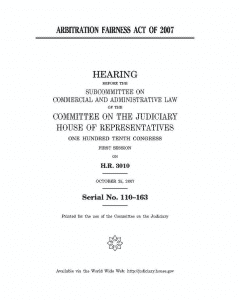Arbitration Legal Definition
“What is an Arbitration?”
Call Our Lawyers for Legal Help: 800-392-4529
A
-
Arbitration
Arbitration legal definition: Arbitration is the process of using an arbitrator to settle a dispute. In the legal world, arbitration is considered a type of Alternative Dispute Resolution. The purpose of arbitration is to handle a claim without filing a lawsuit.
Arbitration hearing types – and the rules that govern them – can vary greatly. Generally, they are less formal than court proceedings, and contain many of the same elements. The procedure generally includes these steps:
-
The party making the complaint sends the opposing party formal notice of their intent to enter into arbitration. This notice also details the nature of the dispute itself.
-
The opposing party is then given a set time to respond to the formal request in writing.
-
Arbitrators are chosen. The number of arbitrators varies: In some cases a sole arbitrator may preside over a hearing, while in other cases there could be an entire panel. Arbitrators are selected using input from both parties, and are generally judges or highly experienced attorneys.
-
An arbitration hearing, which generally takes a few hours, is then conducted.
In many instances the rules for arbitration proceedings are set forth contractually, and must abide by specific deadlines. During the hearing, both parties will have an opportunity to present information before the arbitrator, who is designed to be a neutral party. It will include:
-
Opening statements
-
The presentation of evidence
-
Verbal arguments
-
Witness testimony
This streamlined process is designed for expedited dispute resolution. Following the hearing, the arbitrators will make a ruling by a stipulated deadline. In some instances, arbitration rulings may be final while others are appealable.
Tell Us What Happened: 800-392-4529
*** NO FEE$ UNLESS YOU WIN ***
Tell Us What Happened
***NO FEE$ UNLESS YOU WIN***
Arbitration in Car Accident Injury Cases
If you’ve been injured in a car accident, your policy may allow you to enter into arbitration with your insurance company. Doing this may be in your best interest if:
-
Negotiations regarding the terms of your settlement have halted or
-
You received a final settlement and it’s a low ball offer
It should be noted that, in many instances, your insurance company is not required to enter into arbitration with you. If your insurance company is unwilling to engage in arbitration, it may be necessary for you to then threaten to file a lawsuit to recover damages.
Arbitration hearings in car accident injury cases are typical in claims involving uninsured or underinsured motorist coverage claims.
However, if your insurance company agrees to arbitration, the entire process could take as little as three months and includes several steps:
-
Paperwork is filed and arbitration is initiated
-
Both parties are then given a 30-day period to exchange information and prepare for the proceedings
-
Arbitrators are selected
-
A hearing is conducted
-
A decision – or award – is handed down within a few weeks. These awards are typically binding, which means they cannot be appealed.
Arbitration in Medical Malpractice Cases
If you were injured as a result of a medical mistake, it is likely that your case will be required to be settled through mediation. That’s because the lionshare of insurance policies in the United States include provisions that require medical malpractice claims to go through the arbitration process.
However, there are instances where such stipulations can be invalided with the help of an experienced medical malpractice attorney. It is possible to have clauses mandating arbitration invalidated when:
-
Contract language includes a 30-day statute of limitations on making claims
-
Contract language that binds only one party
-
Contract language that does not comply with state medical malpractice law
Arbitration in Personal Injury Cases
In most cases, slip-and-fall, product liability, and other injury claims will not be settled through arbitration. In fact, many experienced personal injury attorneys would recommend against entering into arbitration for personal injury actions. That’s because by doing so you are forfeit your opportunity to have your case heard before a jury.
In fact, if you enter into arbitration hearings and lose, you will have very limited appeal options. Arbitration awards are binding. In order to appeal, you would have to prove that the decision was “arbitrary and capricious,” which means that it was not only wrong but contrary to presented evidence.
Arbitration in Workers’ Compensation Cases
In Pennsylvania Workers’ Compensation cases, it is possible that you may be forced to go through an arbitration process known as Alternative Dispute Resolution. If either the injured worker or their employer requests mediation, a mandatory ADR meeting is held.
During this process, both the injured employee and representatives for their employers meet with a workers’ compensation judge informally. While you are not required to hire a lawyer to represent you for Alternative Dispute Resolution, the process is best navigated with the help of an experienced workers’ compensation attorney.
Sources:
https://adr.findlaw.com/arbitration/what-is-arbitration-.html
https://injury.findlaw.com/car-accidents/car-accident-arbitration-process-and-timeline.html
https://www.alllaw.com/articles/nolo/medical-malpractice/arbitration.html
Return To Legal Glossary
Read more from Pribanic & Pribanic:
“If someone has a serious case, they will get a great effort and a great outcome working with us,” award-winning attorney Victor Pribanic of Pribanic & Pribanic told Best Lawyers Magazine.








